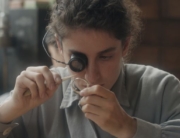
Nina Hoss as Barbara (Adopt Films)
Set in the former East Germany (GDR) of 1980, Barbara is German director Christian Petzold’s first period film, and it feels like a total immersion into the sights, stresses, and the subtle solidarity among those living in the workers’ paradise that his parents fled.
For his fifth collaboration (including Jerichow) with the magnetic and statuesque Nina Hoss, he created the title role of Dr. Barbara Wolff, who has just been exiled to the GDR’s boondocks from East Berlin. She is assigned to live in a crumbling apartment, and though she settles in at her new job at the provincial hospital, she’s constantly nervous about being watched.
She skittishly looks around, whether riding her bike or taking a train, especially when she meets her secret contacts, after which she surreptitiously buries packages of money and travel documents. She’s always looking behind her, but just because you’re paranoid doesn’t mean somebody isn’t following you. Her suspicious behavior is justified when the menacing local officer from the secret police (the Stasi) comes calling to humiliatingly remind her that her exile is a continuing punishment for applying for an exit visa—and she has more to hide from the officer. Her dour expression and wary mien vanishes when she sneaks off into the woods into the arms of her lover from West Berlin, Jörg (Mark Waschke), for a passionate reunion.
At least the uniformed Stasi agents are ruthlessly overt. In a country where over 15 percent of the population was informing at some point to the Stasi, who can she trust? (I recently visited the Stasi Museum at its former headquarters in Berlin, and this film perfectly captures that frozen-in-time look.) She’s leery of her co-workers, who resent her cosmopolitan attitudes. But even amidst the shortages and inadequacies of the dinky hospital (filmed at an eerily period-perfect facility the filmmakers found at a “Ghost Places in Germany” website), she reluctantly comes to respect their dedication, especially a McDreamy doctor, Andre (Ronald Zehrfeld), and they her confident professionalism in dealing with young patients brought in from a brutal work camp. Barbara devotedly treats the teenaged Stella (Jasna Fritzi Bauer) with as much emotional and maternal support as medical.
When Barbara still sneaks off to another assignation with Jörg at a hotel, he finalizes plans for her risky escape across the Baltic Sea, but he becomes annoyingly condescending. He tells her she won’t have to worry about working when she joins him, such that Barbara, in an amusingly ironic scene, finds herself in the awkward position of having too much in common with a young prostitute in the room next door, who can’t wait to crossover and surround herself with Western fashions and appliances. (It’s not clear why the Stasi wouldn’t be monitoring what seems like a fancy hot sheets border hotel for sugar daddy Western businessmen.)
While Petzold shows that middle-class professionals could lead comfortable, if compromised, lives in the GDR, the romantic option offered to Barbara is a bit too convenient (and this McDreamy is a sophisticated intellectual to boot). But the film builds tension not just for what choices Barbara will make, but by leaving open the mysteries of the sympathetic human heart.






Leave A Comment